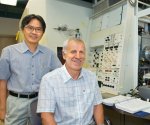One of the issues preventing current readily available solar panels from harvesting the maximum amount of energy from sunlight is the inability of module solar cells to take advantage of the sun’s full spectrum of light.
Sunlight is composed of many different light wavelengths, from low-energy infrared through visible light to high-energy ultraviolet.
While solar cells have been made with the ability to soak up the full spectrum previously, none have been commercially viable in terms of the general solar power market.
Leader of the Solar Energy Materials Research Group in the Materials Sciences Division (MSD) at the U.S. Department of Energy’s Lawrence Berkeley National Laboratory (Berkeley Lab) Wladek Walukiewicz and his team recently demonstrated a solar cell that can harvest nearly the entire solar spectrum and can be made using common solar cell manufacturing techniques.
The new solar cell material the team has developed is made from a highly mismatched alloy – gallium arsenide nitride, which can be created using metalorganic chemical vapor deposition (MOCVD), a very common method of manufacturing compound semiconductors.
Using their new multiband material in a test cell, the researchers illuminated it with the full spectrum of sunlight and found light penetrating the device generated current from all three energy bands – valence to intermediate, intermediate to conduction and valence to conduction – and responded well to all elements of the spectrum, from infrared well into the ultraviolet.
The testing shows promise of highly efficient solar cells that will be practical to produce in the not-too-distant future.
Source/image source












































